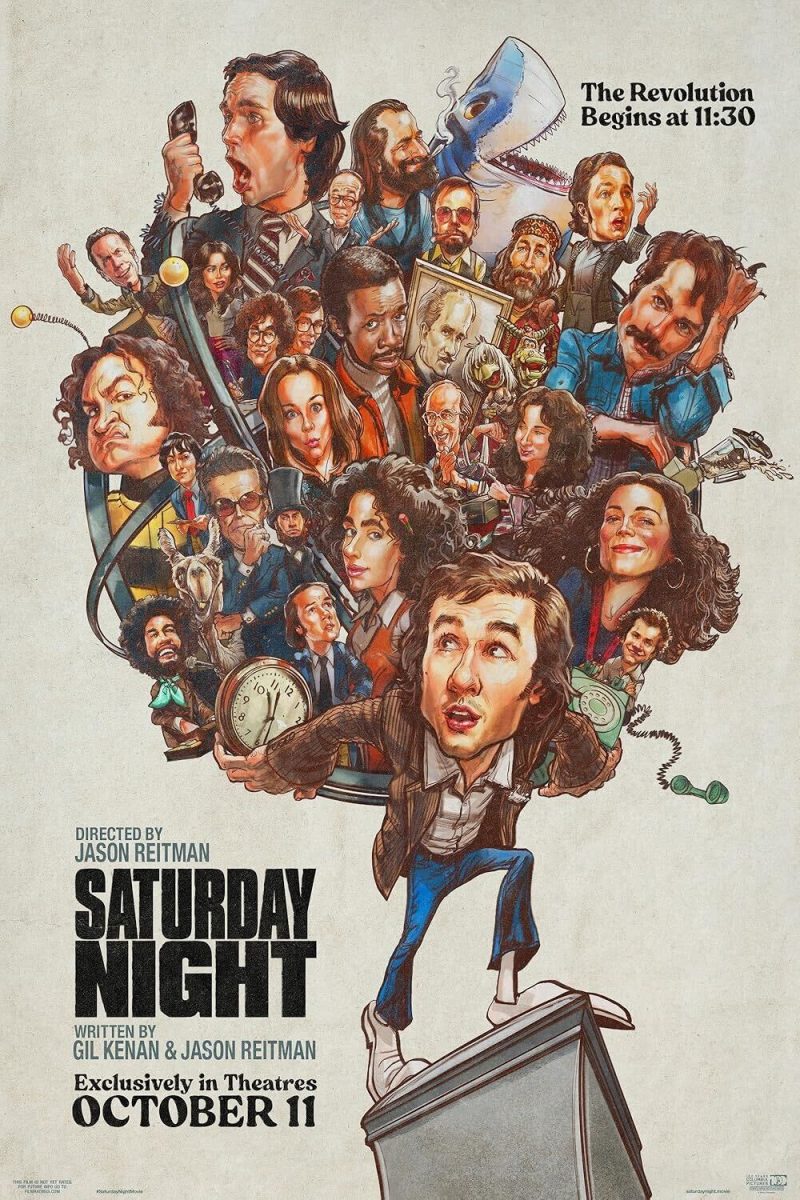The debut of “Saturday Night Live” pushed the stakes of live television. Jason Reitman’s “Saturday Night” does not let viewers forget those words — mainly because nearly every character in the film utters something along the lines of that sentence. Unfortunately, beyond this incessant reminder, Reitman’s representation of the 90 minutes leading up to the first episode of such a groundbreaking show falls short.
Directed and written by Reitman and Gil Kenan, “Saturday Night” offers a backstage pass to the night of Oct. 11, 1975, when the first episode of the most popular late-night live sketch comedy variety show aired, created by Lorne Michaels. Tensions remain high for this episode because “Saturday Night” would replace reruns of “The Tonight Show Starring Johnny Carson.” The film follows the simultaneous burden and excitement behind the eyes of a young, eager Michaels alongside a cast of, at the time, unknowns.
The film tries its best to recreate the high stakes of Michaels’ NBC-sanctioned endeavor through the kinetic camera shots and nearly every little thing going awry, such as the light fixture setting fire to a couch during dress rehearsal at the top of the 90 minute or John Belushi’s breakdown on the ice-rink at 15 minutes to showtime. These mishaps, coupled with the rushed editing of the film, should result in an accurate representation of this chaotic night, but they instead trivialize it, prioritizing shock value over depth and history.
Reitman and Kenan approach the dialogue the same way as the editing — rushed. This decision hurts the film because it portrays conversations that audiences feel eager to hear as merely surface-level. In a conversation between Dan Aykroyd (Dylan O’Brien) and Rosie Shuster (Rachel Sennott), Shuster delivers Michaels’ backstory in an unnatural manner, clunky in its passive positioning in the film.
Overall, many of the actors appear caught up in impressions rather than character, so the inaugural cast members become caricatures. Matt Wood leans too much into John Belushi’s arrogance, with most of Michaels’ night spent chasing around Belushi with his contract. This performance robs Belushi of any depth, offering audiences only a glimpse of his vast character in the ice-rink scene. However, Lamorne Morris depicts Garrett Morris, the first Black cast member of the show, with care and profundity, encapsulating the weight and complexity of this position well as he repeatedly asks what his role means in the cast.
Gabriel LaBelle delivers an understated performance as Michaels, which bolsters the film’s credibility. The environment at 30 Rockefeller consumes him: fake blood splatters on his crisp white shirt, a room of NBC executives featuring a devilish Willem DaFoe as David Tebet looming over Michaels’ small frame. Yet, Reitman’s portrayal of this fragility throughout the film emphasizes the success of this absurd venture, making the payoff of Tebet’s decision to sanction the show all the more rewarding.
Reitman’s “Saturday Night” was complicated in its direction and surface-level in its execution. However, a beautiful and accurate set design, a compelling portrayal of Michaels and the tension of the night still pervading through the screen all offer audiences an entertaining, nail-biting watch.
3 ½ slabs of authentic brick out of 5














